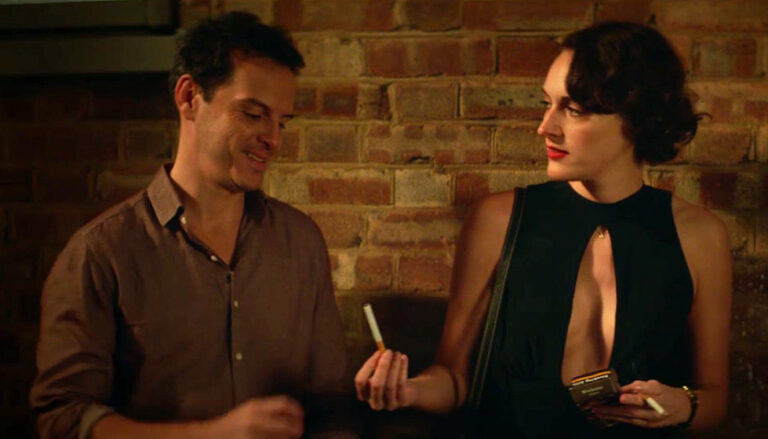At the beginning of season 2, Fleabag’s nose is bleeding incessantly. She tries to control the blood, slyly looks at the camera, and remarks, “It is a love story.” Yes, but it is also a story of her finding faith. Fleabag has been coping with both guilt and grief after her best friend died because of her. She either pushes away or is isolated by each one of her loved ones. The sadness is inexplicable and the only way for her to survive this tortured existence is by assuming a character.
To be everything she does not really feel inside like pretty, cool, witty. The only way she can live with herself is by performing and pretending and hence, she creates an audience. Her meta-commentary gives her the status of some God-like figure but Fleabag is actually on the side of the devil. And the only person who can call out her bluff is someone really on the side of God and here enters ‘The Hot Priest.’
The Hot Priest is sort of an unconventional priest. He drinks, he parties, and curses. Fleabag has to ask him, “Are you a real Priest?” He is a match for Fleabag in every which way and the conflict here is between the Priest’s belief in Christianity and Fleabag’s atheism. By bringing together two very opposing worldviews, the show ends up subversing both of them.
The Priest is officiating the wedding of Fleabag’s father and her godmother and they meet at a restaurant. Both are immediately attracted to each other’s humor and looks. Normally Fleabag will seduce a guy like this and sleep with him. But here the situation is different. It is a forbidden apple.

If Fleabag mocks the religion, she is also being mocked. When she convincingly declares to the Priest “I don’t believe in God”, a copy of Titian’s Noli me tangere falls from the wall behind her which visibly shakes Fleabag and silently makes her question her own conviction. If any book engrosses and shocks Fleabag, it’s the Bible. In a remarkable confessional scene, Fleabag’s conflict around faith and existence becomes apparent: “I want someone to tell me what to believe in.” She kneels down and when she looks up, she sees the Priest, the follower of God himself.
Their bodies come in unison as they start kissing each other until the painting of Christ falls down and interrupts them. Hence, the conflict between faith, doubt, and religion continue. But it also tells us something else. Coming together of bodies is not only the result of void desire but deep love and empathy, something which is at the core of the religion.
The Priest himself continues to be tested in his faith and actions. The entry of Fleabag in his life challenges him in his faith and he has to fight his own temptation. By the end, he breaks his sacramental vows and pastoral concern and sleeps with her. However, sleeping together is not a distraction from life as it has been for both Fleabag and Priest before but a very celebration of it. It is Fleabag turning human again, who feels that not only she can love but is also worthy of being loved. She is finding that she can live a life of dignity and of being understood. That despite her mistakes, someone will forgive her.

This happens when Fleabag cannot speak to her imaginary audience anymore. The Priest begins to overhear her asides. Whenever she looks at the camera, he questions her, “Where did you just go?” He is the only person who can see through the deceit that Fleabag is playing with her life. Fleabag is completely uncensored in her interior monologues but she achieves full transparency in her behavior only with the Priest. Similarly, the show plays on the imagery of foxes which the Priest claims have been after for years.
In the end, it is only Fleabag who notices the fox. It underlies an important idea: If anyone can understand the Devil, it’s God and vice-versa. There is as much conflict as there is affinity.
And finally, it is the love itself – the essence of religion and of human existence. The Priest is self-admittedly lonely and so is Fleabag. They both try to live life in a way to divert themselves from this desperate feeling of being alone. The Priest with his commitment to the Church and Fleabag through her promiscuity.
Yet ultimately, it is a human-to-human bond of friendship that gives them a sense of being seen. In the end, Fleabag looks at the Priest and says, “It’s God, isn’t it?” It was love. It has always been love. The wall between God and the Devil crashes. The Priest’s faith will always have doubts and Fleabag, in her doubts, found faith.
